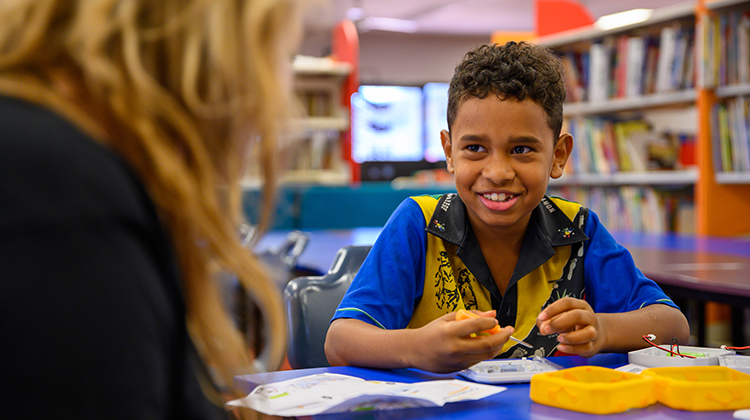Far North Queensland students switched on to STEM

Students from the Northern Peninsula Area State College in Far North Queensland were the first to take part in a new Indigenous Education Program that encourages practical skills and offers a taste of global citizenship.
More than 300 students across three campuses took part in the program assemble 600 SolarBuddy solar lights. Each student gave one light to a child living in extreme energy poverty and kept one light for themselves.
The solar lights allow children to safely study after dusk with a reliable and safe source of light, 300 of the lights assembled went to students in PNG, where 26.3 per cent of children are not enrolled in primary education and energy poverty limits study to daylight hours.
SolarBuddy Education Programs Officer, Olivia King says, “Our first education program was designed to introduce students to the Sustainable Development Goals, extreme energy poverty and renewable technology. Having students assemble a solar light that will be sent to a child living in extreme energy poverty reinforces the learnings and empowers students.”
“The Indigenous Education Program was developed based on the original program, with the curriculum updated to incorporate Indigenous Knowledge and Science. We collaborated with Indigenous Educators and conducted extensive research to ensure the program was culturally sensitive, while linking traditional knowledge with mainstream science and the Sustainable Development Goals,” she says.
The enquiry-based activities seek to develop student's skills in creative and critical thinking, problem solving, intercultural understanding, and student collaboration. Extensive learning resources designed by teachers and aligned with ACARA standards for each year level are available for the program so teachers can run the sessions as part of their curriculum.
The program runs for half a day and includes an educational presentation, a student led light assembly and engaging activity sheets.
“Where feasible, we love to present the sessions ourselves or with the help of our incredible corporate volunteers, however, we provide in-depth teacher notes for self-facilitation."
The instructions are visual and simple to ensure they do not take away from the problem-solving competent. The lights have been designed with purpose, each light can be assembled by a child as young as six and they have been humanised with eyes, arms, and feet on the bumper, making the light more accessible to children.
“Our lights are made from ABS plastic (Acrylonitrile butadiene styrene), we chose this material due to its incredible strength and durability. The lights themselves last up to 10 years, with two rounds of battery replacements, seeing children through their crucial schooling years. The lights also have sun exposure protection which is essential as they run off solar energy,” says King.
The lights use Nickle metal hydrate batteries (750mAh 3.6V NI-Mh Battery) as it lends durability and flexibility. This is important as as the lights travel across the globe to events and schools before they are distributed to some of the most remote areas in the world. The 0.6W solar panel can fully charge in eight hours and last eight hours on full brightness and 16 hours on the 50 per cent brightness setting.
Silicone rubber is used for the bumper and seals to ensure the light is waterproof, our lights have an IP65 waterproofing rating.
SolarBuddy General Manager Billie Murphy said the new program is unique in its acknowledgement of Aboriginal and Torres Strait Islander people’s contribution to STEM.
“We continue to learn so much from Traditional Indigenous Knowledge about skills and philosophies, land management, science, medicine and the sustainable management of the environment. Incorporating Indigenous Knowledge into our STEM Education program was a priority to ensure the best program outcomes,” Ms Murphy said.
Supported by the Origin Energy Foundation, SolarBuddy worked in collaboration with Indigenous Educators to develop the program to ensure it supported and inspired Indigenous students to increase their STEM engagement.
Ruth Lee, Origin Energy Foundation volunteering program manager added, “Our volunteers have taken the SolarBuddy program to more than 100 schools across Australia over the past two years, but this new Indigenous Education Program is something we are particularly proud to support with its strong links to Indigenous Knowledge and science,” Ms Lee said.
Schools interested in running a SolarBuddy session for their students should contact the Origin Energy Foundation [email protected] or SolarBuddy [email protected]